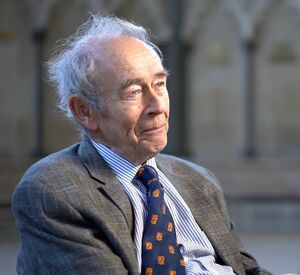Difference between revisions of "Max Atkinson 1944-2024"
SaulAlbert (talk | contribs) |
SaulAlbert (talk | contribs) |
||
| Line 1: | Line 1: | ||
| − | [[File: | + | [[File:Max Atkinson.jpg|300px|thumb|left|Max Atkinson 1944-2024]] |
Max Atkinson died on July 3rd in Wells, England. He was 80. He was a celebrated and dominant figure in British ethnomethodology in its formative years, a leading proponent of conversation analysis, and a remarkably gifted and adept exponent of its application in public affairs. | Max Atkinson died on July 3rd in Wells, England. He was 80. He was a celebrated and dominant figure in British ethnomethodology in its formative years, a leading proponent of conversation analysis, and a remarkably gifted and adept exponent of its application in public affairs. | ||
Revision as of 00:58, 11 July 2024
Max Atkinson died on July 3rd in Wells, England. He was 80. He was a celebrated and dominant figure in British ethnomethodology in its formative years, a leading proponent of conversation analysis, and a remarkably gifted and adept exponent of its application in public affairs.
Max began his career as a statistician in the British Home Office (the UK equivalent of the US Department of Justice), but became disillusioned with the quality of the statistics he was analyzing. He resigned to take a PhD at Essex University in what was then perhaps the most talented Department of Sociology in the country. The later 1960s witnessed an upsurge of discontent with the ‘official statistics’ on which much sociological analysis of the period was based. It also saw the parallel rise of ‘societal reaction’ theory which held that ‘deviance’ was a product of social labeling, and that deviance statistics were not exempt from this process. Aaron Cicourel and John Kitsuse in the US and Stan Cohen in the UK were especially prominent figures in this movement.
Max’s dissertation (1969) focused on the methods of police work and coroners’ deliberations in investigating cases of suicide. Using ethnographic fieldwork and interviews with coroners and police, and informed by an ethnomethodological interest in common sense reasoning practices, he uncovered an essentially circular process in which official presumptions about the ‘suicide-prone’ were translated into statistics that reified those presumptions as ‘fact’. The dissertation, published as Discovering Suicide: Studies in the Social Organization of Sudden Death (Macmillan, 1978), was remarkable for its cogency and lucidity in a chaotic intellectual period, and became a basic element of the social science syllabus for UK high school seniors for many years subsequently.
After brief stints at the Universities of Lancaster and Manchester, Max took a research position at the Centre for Socio-Legal Studies at Oxford. Strongly influenced by the work of Sacks and Schegloff, he focused on courtroom interaction processes and completed a pathbreaking book – Order in Court (Macmillan, 1979) – with Paul Drew. This study was the first to apply principles of sequential conversation analysis (CA) to an institutional setting characterized by a high degree of formality. Subsequently, he co-edited an important collection of CA studies – Structures of Social Action (Cambridge, 1984) – with John Heritage. Although based on the proceedings of a 1979 conference in Oxford, the book became almost a surrogate textbook during a period in which the CA field was still forming and guidance about its implementation was scarce on the ground.
During this period, Max also developed an entirely new line of research. With a long-standing interest in persuasive speaking to juries blocked by legal restrictions on in situ jury reactions to legal argument, he found an alternative -- political speech – unhampered by these constraints. While watching an awards show on television, he observed that audience reactions to award winners were muted if announcers failed to produce the winner’s name at a key moment: the end of the announcement. Could this apply in other contexts too? Using data from political speeches, he was able to show that and how a variety of rhetorical devices – some of them going back to antiquity – could produce these focal moments for audience reaction. Published in the seminal Our Masters’ Voices (Methuen, 1984), these findings were extraordinary. Those who were prone to dismiss ethnomethodological and conversation analytic studies as preoccupied with trivialities, found themselves confronted by facts grounded in fundamental CA insights that were of wide-ranging societal significance and import. His findings also had a sensational impact not only on political scientists and broadcasters, but also on politicians themselves. Max was asked by Granada Television to develop a program documenting his training of a novice speaker who was to make a brief speech at her party’s political convention, with both the training and the speech itself to be broadcast in a World in Action program. The speech was a runaway success, receiving a standing ovation and widespread media coverage. It led to an invitation to conduct a seminar on political speech at the White House – becoming perhaps the most influential single finding by a conversation analyst to date – and prompted Max to launch his own communication company, Atkinson Communications.
In later years, Max served as a speech writer and advisor to Paddy Ashdown, the leader of the Liberal Democrat Party in England for over a decade, and presented many courses on public speaking at Henley Management College and through Atkinson Communications. In 2015 he was awarded a lifetime achievement award by the UK Speechwriters’ Guild, and was made a Fellow of the Academy of Social Science (FAcSS) in 2016.
Max was a man of great drive and energy and a highly influential ambassador and practitioner of ethnomethodology and conversation analysis. He was possessed of wit, grace and charm, an excellent raconteur, and very quick to see the connections and implications both of theoretical arguments and empirical findings. He was, and remains, an icon to our field. Max is survived by his two sons, Simon and Joe.
John Heritage, UCLA
